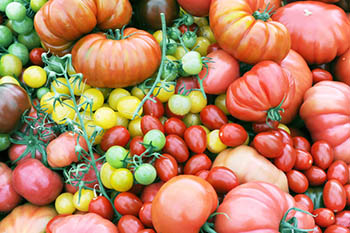
The tomato hitching a ride home in your grocery bag today is not the tomato it used to be.
在你买了番茄装进购物袋里拿回家的功夫,它就已经跟过去不一样了。
No matter if you bought plum, cherry or heirloom, if you wanted the tastiest tomato, you should have picked it yourself and eaten it immediately.
不管你买的是李子番茄、樱桃番茄,还是纯种番茄,要想吃到味道最好的番茄,就得自己采摘,然后当场吃掉。
That’s because a tomato’s flavor — made up of sugars, acids and chemicals called volatiles — degrades as soon as it’s picked from the vine.
那是因为番茄的味道——由糖、酸和几种被称为挥发物的化学物质构成——自它从藤上被摘下来的那一刻开始,就在逐渐减弱。
There’s only one thing you can do now: Keep it out of the fridge.
现在你能做的只有一件事:让它远离冰箱。
Researchers at The University of Florida have found in a study published Monday in Proceedings of the National Academy of Sciences that when tomatoes are stored at the temperature kept in most refrigerators, irreversible genetic changes take place that erase some of their flavors forever.
佛罗里达大学(The University of Florida)的研究人员在周一发表于《美国国家科学院院刊》(Proceedings of the National Academy of Sciences)的一项研究中发现,番茄在大多数冰箱保持的温度下保存时,会发生不可逆转的基因变化,由此永远失去它们的一些味道。
Harry J. Klee, a professor of horticultural sciences who led the study, and his colleagues took two varieties of tomatoes — an heirloom and a more common modern variety — and stored them at 41 degrees Fahrenheit before letting them recover at room temperature (68 degrees Fahrenheit).
领导这项研究的园艺学教授哈里•J•克利(Harry J. Klee)及其同事使用了两个品种的番茄——纯种番茄和一种更常见的现代品种。
When they looked at what happened inside the tomatoes in cold temperatures, Dr Klee said the subtropical fruit went into shock, producing especially damaging changes after a week of storage.
他们将这些番茄储存在41华氏度(约合5摄氏度)的温度下,之后再把它们转移到室温(68华氏度,约合20摄氏度)下。克利表示,对番茄在低温下的内部变化进行研究后,他们发现这种亚热带水果进入了休克状态,在低温储存一周后发生了损失极大的变化。
After they were allowed to warm up, even for a day, some genes in the tomatoes that created its flavor volatiles had turned off and stayed off.
恢复室温后——哪怕只有一天——番茄中一些产生其味道挥发物的基因便不再起作用,而且无法恢复。
It’s like a symphony: Remove the violins and the woodwinds, Dr Klee wrote in an email.
就像是一首交响乐:去掉小提琴和木管乐器,克利在一封邮件中写道。
You still have noise, but it’s not the same.
你还能听到乐声,但它已经不一样了。
Add back just the violins and it still isn’t right.
再把小提琴加回去,也还是不对。
You need that orchestra of 30 or more chemicals in the right balance to give you a good tomato.
你需要那30种或更多的化学物质像交响乐一样平衡组合在一起,才能有一个好味道的番茄。
When you can get fresh tomatoes, Dr Klee recommends storing them at room temperature, to preserve their flavor, and eating them within a week of bringing them home.
根据克利博士的建议,如果你能买到新鲜的番茄,就在室温下进行保存,以便保持它们的风味,而且最好在买回家一周内把它们吃完。
If you see your grocer storing them at temperatures that are too cold, tell them not to, he says.
如果你看到杂货店老板把它们储存在温度很低的冰箱里,就告诉他们不要那么做。
But this research may seem mostly academic.
但这项研究的意义似乎主要在于学术方面。
The average American consumes nearly 20 pounds of fresh tomatoes a year.
普通美国人每人每年平均会吃掉将近20磅(约合18斤)新鲜番茄。
And despite researchers, industries and farmers all striving to create the tastiest tomatoes, there are some things we can’t yet control.
此外,尽管研究人员、企业和农民全都竭力产出更美味的番茄,但有些因素我们还无法控制。
After all, most of the tomatoes we eat out of season are plucked from their vines probably in Florida or Mexico, just as they started to ripen.
毕竟,我们吃的大多数反季节番茄刚开始成熟,可能就被人在佛罗里达州或者墨西哥从藤蔓上摘了下来。
They are sorted, sized, graded and packed into a box with other tomatoes, totaling 25 pounds.
它们被储存,测量大小,划分等级,并和其他番茄一道被装箱,每箱重25磅。
Then they stay in a humidity and temperature-controlled room (no less than 55 degrees Fahrenheit) and ingest ethylene, a gas to make them ripen, for two to four days before being transported on a temperature-controlled truck to a warehouse.
接着,它们要在一个湿度和温度都受到控制的房间里(不低于55华氏度)待上两到四天,吸收一种用于催熟的气体——乙烯,随后被装上一辆控温的卡车,运往一个仓库。
There they are repackaged, re-sorted and shipped to your grocer.
在仓库里,它们被重新包装,重新拣选,并送到你家附近的食品杂货店。
There, if demand is low or if there’s no room, they may be stored in a fridge, and by the time you get them, it’s been a week to ten days.
在那里,如果需求量不大或者空间有限,它们会被放在一台冰箱里储存,等到你买下它们的时候,可能已经过去一个星期甚至十天了。
It’s probably never going to equal the one that matured in your backyard over the 80 or 90 days that you grew it, but it beats stone soup said Reggie Brown, a manager at Florida Tomato Committee, which produces up to half of America’s fresh tomatoes in the winter.
它或许永远也无法媲美你在自家后院种的、经过八九十天自然成熟的番茄,但比石头汤强,佛罗里达番茄委员会(Florida Tomato Committee)的负责人雷吉•布朗(Reggie Brown)说。冬季里,美国多达一半的新鲜番茄是由该委员会供应的。
In cold months, should you endure a tomatoless diet? There are alternatives, says Dan Barber, chef at Blue Hill and Blue Hill at Stone Barns in New York, who has received multiple James Beard Awards.
在寒冷的月份里,是不是该忍受没有番茄的饭菜呢?纽约蓝山餐厅(Blue Hill)及石谷仓蓝山餐厅(Blue Hill at Stone Barns)的大厨、多次获得詹姆斯•比尔德奖(James Beard Awards)的丹•巴伯(Dan Barber)说,还有其他选择。
My advice for consumers is don’t eat a tomato in the winter, he said.
我给顾客的建议是,冬天别吃番茄,他说。
Make a tomato jam in the summer and store and preserve it.
可以在夏天制作番茄酱并妥善储存。
Use dried tomatoes from the store.
从商店里买番茄干来用。
Make a tomato ketchup and can it — you can have it for the whole winter.
做好番茄酱并装在罐子里——可以吃上一整个冬天。











